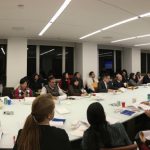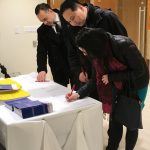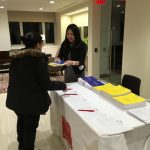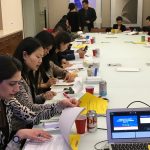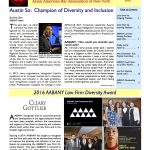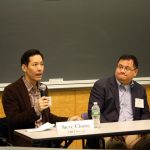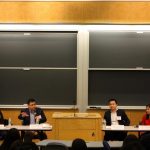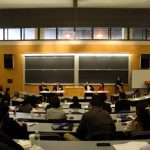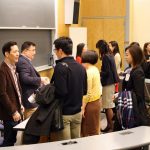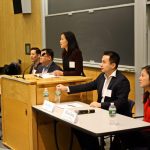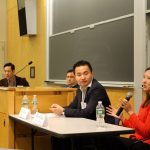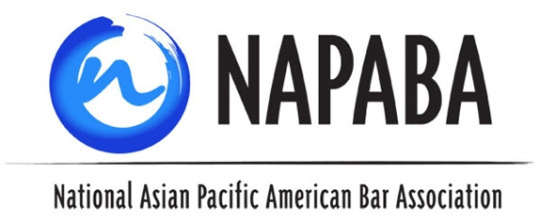
For Immediate Release
March 3, 2016
For More Information, Contact:
Brett Schuster, Communications Manager
202-775-9555; bschuster@napaba.org
Coalition of Bar Associations of Color Holds Annual Meeting
Meets with White House Officials and Congressional Representatives to
Address Issues Affecting Communities of Color
WASHINGTON — This week, the Coalition of Bar Associations of Color (CBAC) gathered in Washington, D.C., for its Annual Meeting. CBAC’s leaders discussed key issues affecting communities of color, including judicial vacancies, criminal justice reform, and immigration reform. This year’s Annual Meeting included visits with key executive branch officials and members of Congress. CBAC met with Department of Homeland Security Deputy Secretary Alejandro Moyorkas, Chief of Staff for the U.S. Citizenship and Immigration Services Juliet Choi, and high-level White House staffers from the White House Counsel’s Office, the White House Domestic Policy Council, and the White House Office of Public Engagement. CBAC also met with Senator Patrick Leahy, and with high-level staffers of Senators Chuck Grassley, Heidi Heitkamp, and Harry Reid. CBAC leaders also met with public engagement staff for the Republican National Committee.
“Given the priorities of CBAC, we urge the nomination and confirmation of diverse candidates for the judiciary over the next year,” said Linda Benally, president of NNABA. "NNABA was honored to host CBAC’s annual meeting convening the CBAC leadership to continue its work, with the White House and Congress to find solutions to issues of concern.”
“The strength of CBAC comes from working together to promote positive change for all communities, particularly in the realms of justice and inclusiveness,” said HNBA National President Robert T. Maldonado. “As attorneys of color, we are intimately aware of what a diverse judiciary, a fairer criminal justice system, and common-sense immigration reform would mean for our nation. The HNBA will continue to work with our CBAC partners to press Congress and the Obama Administration to make progress on these issues.”
“The annual meeting and lobby visits of the national bars of color continue to be a valuable part of our collective advocacy efforts on behalf of communities of color,” said Jin Y. Hwang, president of NAPABA. “For more than 24 years, CBAC has demonstrated the importance of national leaders in the legal profession speaking out together with a unified voice to champion issues such as criminal justice reform, voting rights, immigration, and diversity on the federal bench at all levels.”
“As President of the National Bar Association, I was pleased to participate in the meeting at the White House with the other presidents of the Coalition of the Bar Associations of Color,” said Benjamin Crump, president of NBA. He went on to say: “I advised the White House that the National Bar Association will continue its efforts to promote and pass criminal justice reform this year.”
CBAC was established in 1992 and is comprised of the Hispanic National Bar Association (HNBA), the National Asian Pacific American Bar Association (NAPABA), the National Bar Association (NBA), and the National Native American Bar Association (NNABA). CBAC meets annually every spring so that leaders from its member organizations can discuss issues of mutual concern and advocate in support of their shared interests. For more information contact:
HNBA Contact: Alba Cruz-Hacker (acruzhacker@hnba.com)
NAPABA Contact: Brett Schuster (bschuster@napaba.org)
NBA Contact: Lonita Baker (lonita.baker@gmail.com)
NNABA Contact: Linda Benally (ljdbenally@gmail.com)
CBAC partners:
The HNBA is an incorporated, not-for-profit, national membership organization that represents the interests of the more than 50,000 Hispanic attorneys, judges, law professors, legal assistants, and law students in the United States and its territories. From the days of its founding three decades ago, the HNBA has acted as a force for positive change within the legal profession. It does so by encouraging Latino students to choose a career in the law and by prompting their advancement within the profession once they graduate and start practicing. Through a combination of issue advocacy, programmatic activities, networking events and educational conferences, the HNBA has helped generations of lawyers succeed.
The National Asian Pacific American Bar Association (NAPABA) is the national association of Asian Pacific American (APA) attorneys, judges, law professors, and law students. NAPABA represents the interests of over 50,000 attorneys and over 75 national, state, and local bar associations. Its members include solo practitioners, large firm lawyers, corporate counsel, legal services and non-profit attorneys, and lawyers serving at all levels of government. NAPABA engages in legislative and policy advocacy, promotes APA political leadership and political appointments, and builds coalitions within the legal profession and the community at large. NAPABA also serves as a resource for government agencies, members of Congress, and public service organizations about APAs in the legal profession, civil rights, and diversity in the courts.
Founded in 1925, the NBA is the nation’s oldest and largest national network of minority attorneys and judges. It represents approximately 60,000 lawyers, judges, law professors and law students and has over 80 affiliate chapters throughout the United States and around the world. The organization seeks to advance the science of jurisprudence, preserve the independence of the judiciary and to uphold the honor and integrity of the legal profession. For additional information about the National Bar Association, visit www.nationalbar.org.
Founded in 1973, the NNABA serves as the national association for American Indian, Alaska Native, and Native Hawaiian attorneys, judges, law professors and law students. NNABA strives for justice and effective legal representation for all American indigenous peoples; fosters the development of Native American lawyers and judges; and addresses social, cultural and legal issues affecting American Indians, Alaska Natives, and Native Hawaiians.
APALA-NJ Applauds Governor Christie’s Nomination of New Jersey Superior Court Judge David F. Bauman to Serve as a New Jersey Supreme Court Justice
FOR IMMEDIATE RELEASE: March 1, 2016
CONTACT: Theodore K. Cheng, Esq., tcheng@foxlex.com
NEWARK – On February 29, 2016, Governor Chris Christie nominated New Jersey Superior Court Judge David F. Bauman to a seat on New Jersey’s highest court. If confirmed, Judge Bauman, who is Japanese-American, would be the first Supreme Court Justice of Asian Pacific American (APA) descent in the history of New Jersey.
“This is an incredibly proud moment for the APA community. APALA-NJ commends Governor Christie for again nominating Judge Bauman, who is unquestionably an exceptional candidate and highly qualified to serve on the New Jersey Supreme Court. We proudly support Judge Bauman’s nomination and know that he will be a prestigious addition to the State’s highest court,” said Theodore K. Cheng, President of APALA-NJ.
Judge Bauman was nominated to the New Jersey Superior Court by Governor Jon Corzine, unanimously approved by the Senate Judiciary Committee, and thereafter confirmed by the full Senate in 2008. He was named Presiding Judge of the Civil Division in Monmouth County in 2009 and received tenure last year. He currently serves in the Criminal Division. Last October, the New Jersey State Bar Association honored Judge Bauman with its annual Minority Judge’s Award, which is given “to an outstanding diverse jurist and exemplary lawyers who have demonstrated through personal and professional achievement the ideals espoused” in the State Bar Diversity Committee’s overall mission and objectives.
Prior to taking the judicial oath in July 2008, Judge Bauman was a partner at Bressler, Amery & Ross, P.C., specializing in general litigation with a focus on complex civil and criminal matters. From 1988 through 1991, he served on active duty with the U.S. Marine Corps, working as a prosecutor, defense counsel, and lead trial attorney for high profile criminal matters. He held positions in the Marine Corps Reserve, such as staff judge advocate, company commander and appellate government counsel. His service awards include the Navy Commendation Medal, Letter of Commendation, Commandant, U.S. Marine Corps, and Certificate of Commendation, 2nd Battalion, 25th Marines. In December 2012, Governor Christie nominated Judge Bauman to fill one of two then vacant seats on the New Jersey Supreme Court. However, the Senate never afforded Judge Bauman a confirmation hearing, and the nomination subsequently expired.
“For six years, a seat on New Jersey’s highest court has remained vacant. Unified action from our elected officials is long overdue. Judge Bauman deserves a speedy and fair hearing. This time around, we are hopeful that the Executive and the Legislature will overcome the politicization of the judicial nomination process, and we can move forward with efforts to diversify the State’s Judiciary,” said Jhanice V. Domingo, Immediate Past President of APALA-NJ and Chair of APALA-NJ’s Judicial & Prosecutorial Appointments Committee.
According to the 2010 Census, APAs represent over 8.3 percent of New Jersey’s population. New Jersey is among the top five U.S. states with the largest APA population. Between 2000 and 2010, the APA population more than doubled in 110 New Jersey municipalities and every county in New Jersey experienced double-digit growth of its APA population. APAs were also the fastest growing minority group during the past decade nationwide.
Notwithstanding, APAs remain underrepresented in the State Judiciary. There are only four judges of APA descent out of approximately 360 Superior Court judges. Judge Bauman’s confirmation would advance diversity in a branch of government that does not today adequately reflect the entire constituency of New Jersey. Throughout the State’s history, there have only been two African-American and one Hispanic Justice, and not one APA has ever served on the New Jersey Supreme Court. Although there is still much work to be done to diversify the State Judiciary, Judge Bauman’s confirmation to the State’s highest court would be a step in the right direction. APALA-NJ will continue to work with its sister bar associations on the State and Federal level and leaders in the community to ameliorate the glaring underrepresentation of APAs in the judiciary.
The Asian Pacific American Lawyers Association of New Jersey (APALA-NJ) is New Jersey’s only pan-Asian bar association serving Asian Pacific American attorneys across the State. Founded in 1983, APALA-NJ continues to be a strong advocate for increased diversity in the Federal and State judiciaries. To learn more about APALA-NJ, visit www.apalanj.org.
From the White House: Conference Call on the Supreme Court
Friends,
You are invited to join a conference call for Asian American and Pacific Islander (AAPI) leaders to discuss the Supreme Court with Tina Tchen, Assistant to the President and Chief of Staff to the First Lady,TOMORROW, Thursday, March 3 at 5:00 PM ET.
Here are the conference call details:
- Date: TOMORROW, Thursday, March 3
- Time: 5:00 PM ET, but please join 5-7 minutes early to avoid connection delays
- RSVP: To participate in this conference call, please visit this link, which will give you unique dial-in instructions
- Captioning: To access captioning, please visit this link at the beginning of the call
Please note that this call is off-the-record and not for press purposes.
We look forward to speaking with you soon!
Alissa Ko | The White House
ABA International Law 2016 Spring Meeting: Early Bird Registration has been Extended!

Early Bird Registration Extended to March 7th!
There is still time to save on the Section of International Law’s Spring Meeting at the Grand Hyatt New York this April 12-16, 2016!
Click here to view the full conference agenda including social events!
REGISTER NOW! Early Bird Rates Expire on Monday, March 7th!
Don’t miss this opportunity to hear from our phenomenal lineup of speakers!
CONFIRMED SPEAKERS INCLUDE:
- U.S. Supreme Court Justice, Stephen Breyer
- U.S. Ambassador to El Salvador, Ambassador Mari Carmen Aponte
Attendance at the 2016 Spring Meeting will offer you:
- An entire year’s worth of CLE credits.
- Prominent networking opportunities with influential leaders from around the world
- Can’t miss evening receptions at the most unique and exquisite venues
- Cutting-edge programming on current international legal and ethics issues
- AND MORE!
Hotel Information:
The Section has reserved a room block at The Grand Hyatt New York!
Click here to reserve your room online. Deadline to book is March 18, 2016.
Friday Evening Lecture Series
AAARI’s Friday Evening Lecture Series is back for the Spring 2016 semester! Please join us for a talk on, Making a Global Immigrant Neighborhood: Brooklyn’s Sunset Park, by Tarry Hum, on Friday, March 4, 2016, from 6pm to 8pm, at 25 West 43rd Street, 10th Floor, Room 1000, between 5th & 6th Avenues, Manhattan. This talk is free and open to the general public.
Based on more than a decade of research, Making a Global Immigrant Neighborhood charts the evolution of Sunset Park-with a densely concentrated working-poor and racially diverse immigrant population-from the late 1960s to its current status as one of New York City’s most vibrant neighborhoods. Author and professor, Tarry Hum, will discuss how processes of globalization, such as shifts in low-wage labor markets and immigration patterns, shaped the neighborhood. She explains why Sunset Park’s future now depends on Asian and Latino immigrant collaborations in advancing common interests in community building, civic engagement, entrepreneurialism, and sustainability planning. She shows, too, how residents’ responses to urban development policies and projects and the capital represented by local institutions and banks foster community activism.
Tarry Hum is Professor of Urban Studies at Queens College/CUNY, and serves on the Doctoral Faculty at the CUNY Graduate Center’s Environmental Psychology program. Prof. Hum’s research areas focus broadly on immigration, community economic development, and urban planning. She has researched and published papers on the socioeconomic processes and outcomes of immigrant incorporation in urban labor markets, related issues of immigrant settlement and neighborhood change, and the consequences for urban inequality, race and ethnic relations, political representation, and community definition and development.
To RSVP for this talk, please visit www.aaari.info/16-03-04Hum.htm. Please be prepared to present proper identification when entering the building lobby.
If you are unable to attend the talk, it will be live webcasted on our website, www.aaari.info, beginning 6:15PM EST, and also available the following week as streaming video and audio podcast. See you on Friday!





